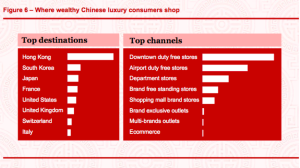According to the research, McKinsey has "discovered a more sophisticated and discerning set of luxury shoppers in China. And while warning signals about the slowing growth of the market should not go unheeded, we believe Chinese consumers will remain one of the biggest drivers of growth in the global luxury market for the foreseeable future."
Good news for duty free - but downtown still wins. And so do prices
Coming from a domestic market notorious for its knock-offs, or fakes, wealthy Chinese are eager to ensure that what they are buying is an original. Caution remains the catchword, so that more reputable and transparent outlets are the preferred targets of their wealth. According to McKinsey, "the quality and authenticity of their purchases….are the top two factors for selecting where they choose to make their purchase".
There is also a strong link to the innate frugality of even the wealthiest of buyers. Price sensitivity is the "other value that has not changed over the years for wealthy Chinese luxury consumers".
The report continues, "This concern is best illustrated by their awareness of price gaps between Mainland China and overseas markets." Prices at home tend to be well over 20% higher than abroad or in duty free stores. Thus, as can be seen from the table below, buying safe and well-priced "means that wealthy Chinese luxury consumers tend to shop either at official channels, such as department stores or brand stores, or at duty free shops."
So, wherever sales are made, getting the "bargain" will be key to closing sales.
The good news here, for airports and their brands, airport and downtown duty free outlets top the list of preferred sales points, with department stores and brand freestanding stores close behind.
Source: McKinsey
But for the luxury brands there's no resting on their laurels
"…luxury brands won't capture these highly valuable and discerning customers by doing more of the same". Building long term relationships will be key to continuing sales. The brands will "need to undertake a complete rethink of how they address Chinese luxury consumers at home. This will require moving from a "sales push" model to building long-lasting relationships at home, while crafting strategies that will make them an integrated part of wealthy travelers' itineraries abroad."
The other good news - for now - is that only 7% of luxury sales are made online
Despite the propensity of Chinese consumers to buy online and the existence of some of the most innovative and conspicuous digital sales platforms, that is not where the wealthy are buying, according to McKinsey. Only a tiny proportion is buying on "official online channels."
And McKinsey doesn't "expect this situation to change much in the near future, as only 16% of wealthy Chinese luxury consumers expect to increase their online luxury spending in 2017."
There is an important wrinkle to this. Luxury brands are progressively moving to "O2O" initiatives, where a prospective buyer may search online, then move to the store to buy.
This process is quite different in China, as online visibility has frequently led the establishment of bricks and mortar retail; by contrast, in the US, where conventional retail is being augmented by online selling, the process of O2O tends to work in the opposite direction.
The inevitable direction would appear to be towards increasing online sales, so that retailers will need to be preparing for change. But for now, if McKinsey is right, duty free retailers have little to fear from online in the short term. And, when the O2O trend does prevail, smart airport duty free should be well positioned to take advantage of it.
* Chinese luxury consumers: More global, more demanding, still spending. By Lambert Bu, Benjamin Durand-Servoingt, Aimee Kim, and Naomi Yamakawa
